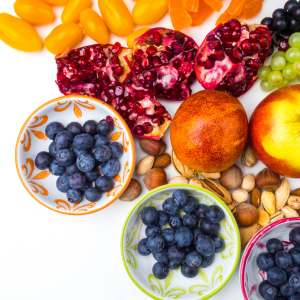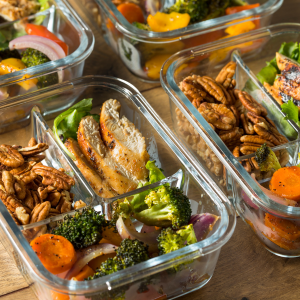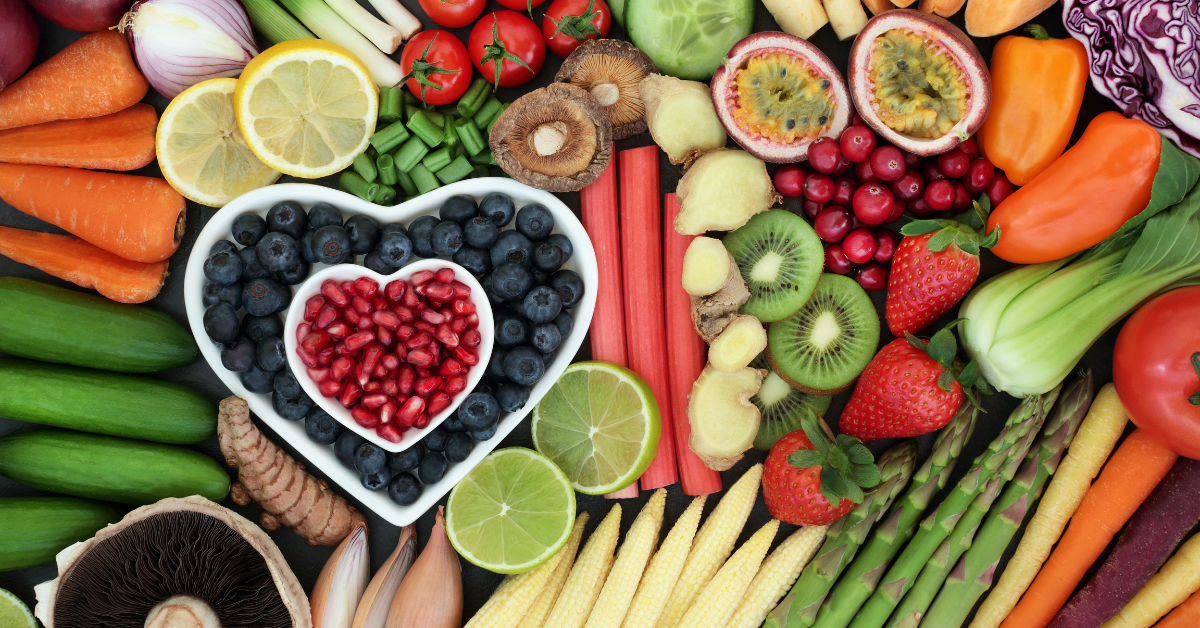Eating healthily is the cornerstone of a vibrant and energized life, but navigating the world of nutrition can be daunting. Worry not, as this blog post distills the best tips for healthy eating into an easy-to-follow guide that will help you make nutritious and delicious choices with ease.
We’ll explore the basics of creating balanced meals, offer practical advice on meal planning and choosing whole foods, share on-the-go strategies to keep you nourished even during your busiest days and emphasize how to make lasting changes without sacrificing taste or enjoyment.
Key Takeaways
- Choose a variety of nutrient-dense foods, including colorful fruits and vegetables, lean proteins, and healthy fats.
- Practice mindful eating and portion control to avoid overeating and promote optimal digestion.
- Make meal planning and preparation a priority to ensure you have healthy options readily available. Seek guidance from a registered dietitian if needed.
- When dining out or on the go, choose grilled or steamed dishes with plenty of vegetables, pack nutritious snacks like fruits and nuts for travel, and opt for water instead of sugary drinks.
The Basics Of Healthy Eating
Choose a variety of nutrient-dense foods and aim for balance with macronutrients such as carbohydrates, protein, and healthy fats while limiting processed and high-fat foods.
Choosing A Variety Of Nutrient-dense Foods

As a healthy lifestyle seeker, selecting a wide array of nutrient-dense foods is crucial for ensuring your body receives the essential vitamins, minerals, and other nutrients it needs to function optimally.
For example, try incorporating colorful fruits such as berries or citrus into your daily diet to benefit from their antioxidants; they not only add visual appeal but also provide immune support.
When it comes to vegetables – think about including both leafy greens like spinach and cruciferous varieties like broccoli or cauliflower since these offer an abundance of vitamins A, C, and K along with dietary fiber.
Opting for whole-grain bread and pasta can help you maintain steady energy levels throughout the day while aiding digestion due to the higher fiber content compared to their refined counterparts.
By consciously choosing diverse nutrient-dense meals each day instead of indulging in ultra-processed foods high in saturated fats – you’ll be well on your way to achieving balanced eating habits that promote long-term health benefits without sacrificing flavor!
Balancing Macronutrients (carbs, Protein, And Fats)
When it comes to healthy eating, balancing macronutrients is crucial. This means ensuring that you’re getting enough carbohydrates, protein, and healthy fats in your diet.
Carbohydrates are important as they provide energy to keep you going throughout the day.
Protein is essential for building and repairing tissues in our body. Lean sources of protein such as chicken breast or fish should be included in your meals along with plant-based options like beans and legumes.
Healthy fats from sources like olive oil, nuts and avocadoes can help lower cholesterol levels and reduce the risk of heart disease when consumed in moderation.
Limiting Processed And High-fat Foods
When it comes to healthy eating, limiting processed and high-fat foods is crucial. These types of foods tend to be high in calories, sugar, salt, and unhealthy fats, which can lead to weight gain and a host of other health problems.
By reducing your intake of ultra-processed foods like chips, candy bars, soda, and fatty meats while incorporating more nutrient-dense options into your diet you’ll see improvements in energy levels and overall wellbeing.
This doesn’t mean you have to completely eliminate all treats from your diet – instead focus on moderation rather than restriction.
Top Tips For Healthy Eating
Plan ahead to ensure you have healthy meals and snacks readily available, practice mindful eating to avoid overeating and choose water as your main beverage to stay hydrated and limit added sugars.
Meal Planning And Preparation
As someone who strives for a healthy lifestyle, I know that meal planning and preparation can make all the difference in sticking to nutritious eating habits. Here are some tips to help you get started:
- Set aside time each week to plan your meals. This will ensure that you have everything you need on hand and avoid last-minute unhealthy choices.
- Consider batch-cooking certain dishes, such as soups or stir-fries, and portion them out for easy grab-and-go meals throughout the week.
- When grocery shopping, stick mainly to the perimeter of the store where fresh produce and lean proteins are located.
- Don’t be afraid to experiment with new recipes using whole foods for a variety of flavors and nutrients.
- Invest in quality food storage containers to keep your prepped meals fresh for longer periods of time.
- Keep healthy snacks on hand, such as cut-up veggies or fruit, to grab on the go when hunger strikes.
- Use herbs and spices rather than added salt or sugar for flavoring your meals.
- Opt for quick-cooking methods like grilling or sautéing instead of deep-frying when preparing your food.
By implementing these meal planning and preparation tips into your routine, you’ll find it easier to maintain a nutritious diet while also saving time and money in the long run!
Mindful Eating And Portion Control
When it comes to healthy eating, one important aspect is being mindful of what and how much we eat. Mindful eating involves paying attention to our food, savoring each bite, and listening to our body’s hunger and fullness signals.
This means avoiding distractions while eating, such as watching TV or scrolling through social media.
Portion control also plays a crucial role in maintaining a healthy diet. Eating too much, even of healthy foods, can lead to excess calorie intake and weight gain over time.
It’s essential to understand proper portion sizes for different types of foods and to avoid overeating by slowing down during meals and stopping when feeling comfortably satisfied rather than overly full.
Staying Hydrated With Water And Limiting Sugary Drinks
As we all know, drinking plenty of water is essential for our body to function properly. But did you also know that staying hydrated can help you maintain a healthy weight and improve digestion? To ensure that you’re getting enough water, aim for at least 8 glasses per day.
On the other hand, sugary drinks like soda or energy drinks can be detrimental to our health. They are often loaded with calories and offer little nutritional value. Studies have shown that excessive consumption of these types of beverages not only leads to weight gain but may also increase one’s risk for chronic diseases like diabetes and heart disease.
Instead of reaching for sugar-laden drinks when thirsty, opt for unsweetened teas or fruit-infused waters as a healthier alternative.
Incorporating Healthy Fats And Fiber
As a healthy lifestyle seeker, you’ll want to focus on incorporating plenty of fiber and healthy fats in your diet.
Fiber-rich foods such as fruits, vegetables, whole grains, nuts, and seeds can help lower cholesterol levels, regulate blood sugar levels, promote feelings of fullness after meals, and support a healthy digestive system.
Healthy fats are also essential for good health. They provide energy for the body and help with nutrient absorption.
By making small changes like sprinkling chia seeds on top of yogurt or adding avocado slices to your sandwich along with some roasted veggies will add vital nutrients required by our bodies while enticing your taste buds!
Seeking Guidance From A Registered Dietitian If Needed
If you’re struggling with making healthy food choices or have specific dietary needs, seeking guidance from a registered dietitian can be a game-changer. They are experts in nutrition and can create personalized meal plans based on your individual needs and goals.
For example, if you have a medical condition that requires dietary restrictions, such as celiac disease or diabetes, a registered dietitian can provide valuable advice on how to manage your symptoms through proper nutrition.
Remember that small changes lead to big results when it comes to maintaining a healthy lifestyle. Seeking the help of a professional like a registered dietitian is an investment in yourself and your future health.
Eating Healthy On The Go
Choose healthy options when dining out, such as grilled chicken or fish and steamed vegetables. Pack nutritious snacks like fruits, nuts, and veggies for travel. Make smart choices at convenience stores by selecting fresh produce or low-fat yogurt.
Choosing Healthy Options When Dining Out
When dining out, it can be challenging to make healthy choices. Here are some tips to help you navigate menus and choose nutritious options:
- Look for dishes that include plenty of vegetables, fruits, and whole grains.
- Choose lean sources of protein like grilled chicken or fish rather than fatty meats.
- Avoid fried foods and opt for grilled, baked, or steamed dishes instead.
- Ask for dressings and sauces on the side so you can control how much you consume.
- Be mindful of portion sizes and consider sharing a meal or taking half home.
- Skip appetizers or share with the table instead of indulging in high-fat options like fried mozzarella sticks or loaded nachos.
- Drink water or unsweetened tea instead of sugary drinks like soda or cocktails that are high in calories and added sugars.
By following these tips when dining out, you can maintain a healthy diet even when enjoying meals outside of your home. Remember to make informed choices based on your nutritional needs and goals, and don’t be afraid to ask restaurant staff questions about how dishes are prepared.
Packing Nutritious Snacks And Meals
As someone who is always on the go, I have found that packing nutritious snacks and meals has been a game-changer for my healthy eating habits. Here are some tips:
- Plan ahead: Take some time to plan your snacks and meals for the week ahead. This will save you time and money in the long run.
- Choose protein-rich snacks: Snacks that are high in protein will keep you feeling full for longer periods of time. Some great options include hard-boiled eggs, nuts, and Greek yogurt.
- Incorporate fruits and vegetables: Packing fresh fruits and vegetables will provide you with essential nutrients throughout the day. Try packing baby carrots, sliced cucumbers, or an apple with almond butter.
- Pack healthy fats: Including healthy fats in your snacks can help keep your energy levels up. Pack a small container of hummus or guacamole with some whole-grain crackers or cut-up veggies.
- Avoid processed snacks: Processed snacks are often high in sugar, unhealthy fats, and empty calories. Opt for whole-food snacks instead.
Remember to pack your meals in portable containers that are easy to transport, such as reusable silicone bags or glass jars. Planning ahead and packing nutritious snacks and meals will help you stay on track with your healthy eating goals no matter where life takes you.
Making Smart Choices At Convenience Stores
I understand that it may be difficult to find healthy food choices at convenience stores, but there are still options available. Here are some smart choices to make:
- Look for fresh fruit and vegetables. Many convenience stores now offer pre-cut fruits and veggies as a snack option.
- Opt for protein-rich snacks like hard-boiled eggs, Greek yogurt, or beef jerky instead of high-sugar options like candy and pastries.
- Choose whole grain options like popcorn, rice cakes, or whole wheat crackers instead of processed snacks like chips.
- Drink water instead of sugary drinks like soda or energy drinks.
- If you need a quick meal, look for pre-made salads or sandwiches with lean protein sources such as grilled chicken or turkey breast.
Remember to always check the nutrition labels and ingredient lists before making a purchase. Avoid items with high amounts of saturated fat, added sugars, or sodium in order to maintain a healthy diet.
Using Meal Delivery Services Or Healthy Vending Machines

As a busy person who values health and nutrition, meal delivery services or healthy vending machines can be lifesavers. Meal delivery services provide the convenience of having healthy meals delivered right to your doorstep.
These services often offer a variety of options, from vegetarian to keto-friendly meals, making it easy to stick to any dietary restrictions. On the other hand, healthy vending machines are great for those on-the-go moments when you need something quick and nutritious.
When using either option, it’s important to pay attention to ingredient lists and nutritional information. Even though they’re marketed as “healthy,” some meal delivery services may still contain high levels of sodium or added sugars.
Making Healthy Eating Sustainable And Enjoyable
In conclusion, the best tips for healthy eating are all about balance and variety. It’s important to focus on nutrient-dense foods like fruits, vegetables, whole grains, lean protein, and healthy fats while limiting processed and high-fat items.
Meal planning and preparation can make it easier to stick to a nutritious diet, but it’s also important to practice mindful eating and portion control. Don’t forget to stay hydrated with water instead of sugary drinks! Eating well doesn’t have to be boring or difficult – there are plenty of ways to make nutritious food enjoyable.
FAQs:
1. What are some general tips for healthy eating?
Some basic guidelines for healthy eating include consuming a variety of fruits and vegetables, limiting processed foods high in sugar and unhealthy fats, choosing lean sources of protein such as fish or poultry, reducing salt intake, and staying hydrated by drinking plenty of water.
2. How can I make healthier choices when dining out at restaurants?
When dining out, you can opt for healthier options by choosing dishes that are steamed or grilled instead of fried or sautéed, selecting meals with more veggies and less meat or cheese, asking for dressings/sauces on the side to control portion size & calories consumption – this will help make sure you’re not overeating fatty ingredients.
3. Are there certain types of food that should be avoided altogether for optimum health?
While all foods have a place within our diets if consumed in moderation – it is generally recommended avoiding highly processed snacks like chips/granola bars packed with sugars/fats/artificial flavoring/ coloring agents etc; You may also want to limit sugary beverages such as soda/juices since they can increase your risk factor of developing metabolic disorders among other things.
4. Should I follow any specific diet plan to achieve overall health goals?
Everyone’s needs differ so it is important to speak with a Registered Dietitian/Nutritionist before changing your diet drastically from what you consume currently – They’ll be able to suggest personalized recommendations based upon medical history/lifestyle factors/preferences/goals determined after analyzing physical test results etc. But in general, terms incorporating diest rich in natural whole foods (fruits/veggies essentially) and low-fat protein will benefit one’s efforts towards maintaining good health long-term.
